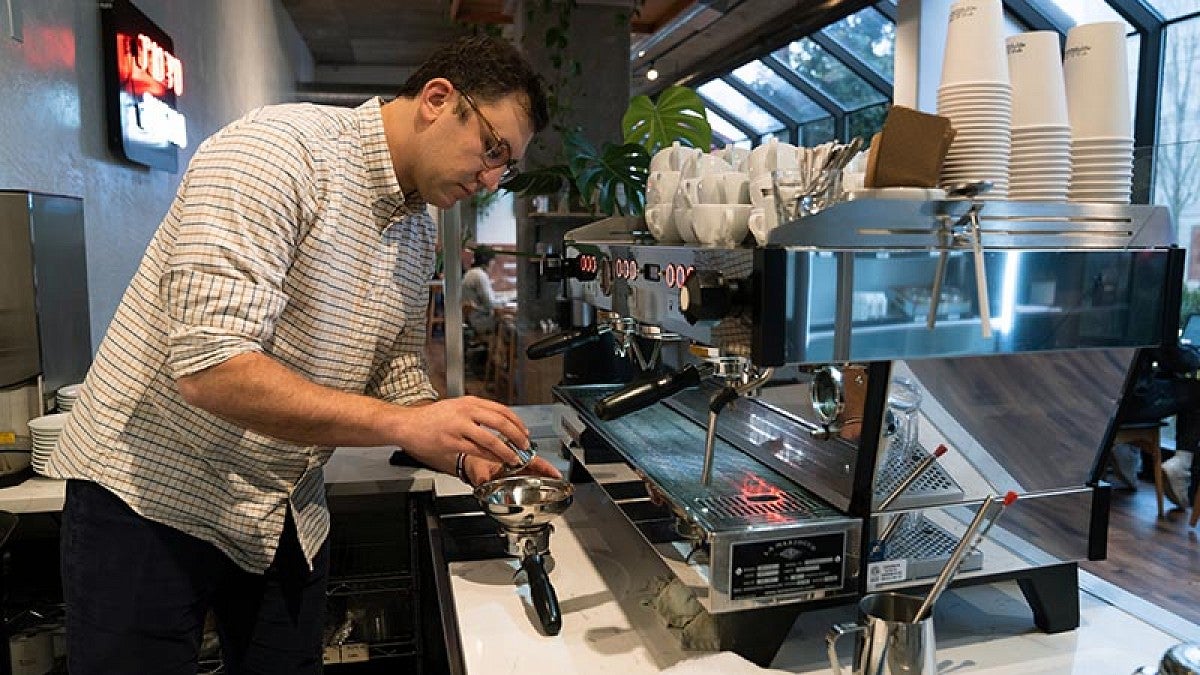The future of good espresso will be brewed with the help of University of Oregon chemist Christopher Hendon, known widely as Dr. Coffee.
After months of grinding through proposals from universities around the world, the Specialty Coffee Association has announced that the UO will be a research partner for a four-year espresso extraction research project.
The project titled "Towards a Deeper Understanding of Espresso Extraction" was announced Nov. 12. It will focus on espresso extraction to guide the development of formal guidelines on processing parameters and an espresso-brewing control chart.
Supported by the association’s Coffee Science Foundation and the Simonelli Group, Hendon’s main collaborators are Oregon State University professors Michael Qian, Elizabeth Tomasino and Jung Kwon, and Jamie Foster of the University of Portsmouth in the United Kingdom.
“This is a landmark moment for both coffee and education, as we are going to try and tackle the fundamental challenge of creating a predictive tool to assess espresso quality,” said Hendon, an assistant professor and computational chemist in the UO’s Department of Chemistry and Biochemistry.
“In addition to the technological advances in the coffee industry,” he said, “this funding will ultimately be used to develop a novel education platform which I intend to use as the basis for a remote general chemistry-type laboratory sequence.”
The UO’s contributions will include a collaboration with the Oregon Center for Electrochemistry, co-founded by chemist Shannon Boettcher, Hendon said. A doctoral student as well as master’s and undergraduate students also will have roles. Experiments will occur in Oregon, England and Italy.
Members of the scientific team are trained in sensory science, food science, chemistry and mathematics.
"The University of Oregon is a first-class public research university and professor Hendon is a well-known, pioneering coffee scientist,” said Peter Giuliano, executive director of the Coffee Science Foundation. “For this project, they will lead an international research collaboration that is likely to produce exciting innovations in espresso science.”
Earlier this year, Hendon and an international team of coffee-interested colleagues published a paper in the journal Matter, showing that grinding beans for espresso more coarsely and extracting a shot of the brew more quickly than current practices dictate could lead to a savings of $1.1 billion a year for U.S. coffee shops.
In the new project, the team will develop new tools that promise to transform the way espresso is measured, including the creation of a device that will allow for the rapid assessment of coffee chemistry and flavor. What they develop will transform an existing espresso brewing control chart into a new version that includes the latest research on sensory, chemical and physical sciences.
The Coffee Science Foundation is a nonprofit organization dedicated to advancing the understanding of coffee and securing its future through research, knowledge-building, and outreach. The Simonelli Group, based in Italy, is a leader in the coffee machine industry and is present on the market with Nuova Simonelli and Victoria Arduino brands.
—By Jim Barlow, University Communications


